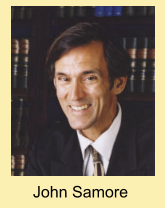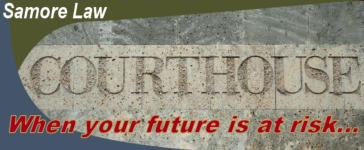

John Samore
Blog: Lawyer’s Insight on Legal
Matters:
- Legal Process -
Lawyer's Insight' is a periodic blog by Mr. Samore on
current legal issues that informs readers how current, legal
events influence Americans' lives. If you would like to ask
Mr. Samore to address a particular concern which you may
have, simply send an email to the address at left with
subject "Questions for Lawyer's Insight."
Click on the links below to quickly reach a particular topic,
or just scroll down to read what is of interest. Other
sources of information from Mr. Samore are on the
Common Questions and About Us pages of this website.
If you don’t see a link to a topic of interest, check the other Lawyer’s Insight pages.
Legal Process
• What are the financial commitments to help avoid conviction consequences? • We just received a Subpoena to testify and don't want to go. What should we do? • I just received a Grad Jury Target Letter! What do I do? • What basic information is needed for criminal prosecution cases? • How does plea bargaining work? • Why can't a simple majority of the Jury reach the verdict?What are the financial commitments to help avoid conviction consequences?
July 14, 2016 Consequences of any conviction can be severe and follow you (and your family) all your life, so we like our clients to be realistic about the challenges that lie ahead. We encourage our clients to quietly consider the financial commitment that is required to retain any experienced private attorney to represent your most precious interests. Because most employed people are ineligible for a Public Defender, you must decide if you can afford a quality defense. Most lawyers do not give clients this opportunity before an office conference, and too many attorneys pressure folks to sign major obligations. Our office does not work that way. We do not try and scare anyone, nor do we minimize the importance and dangers of felony prosecutions. You will hire us because it is the best decision for you. There will always be someone who will undercut the price of a quality attorney, and either demand additional payments down the line or commit less time and effort because your money ran out. You would not fall for that misleading approach from a car salesman, and you are wise not to risk your future to someone who does not confront with the truth, however daunting it may be. You want a lawyer who will also explain how the resources you commit for a qualified forensic examiner or other expert witness, and an experienced, diligent private investigator can be every bit as important as your attorney. These expenses should be included in any initial consultation and determination of what "fees and costs" to defend your case are. When you leave a voice mail or message, find out how quickly your lawyer responds to your reasonable questions and concerns. If the State goes through the Preliminary Hearing procedure, the likelihood is high that you will be bound over for further prosecution. The reason is two-fold: Defense witnesses almost never testify at a Preliminary Hearing, because the Defense does not really know until that Hearing what the evidence is. The second reason is that their standard to bind an accused over is so low, "probable cause" that a crime has been committed, which does not even require fifty percent likelihood in proof. You will not be found "guilty" or "not Guilty" at a Preliminary Hearing or Grand Jury Presentment, so it is basic good sense and legal sense to hold back on showing the prosecutors what problems they have with their case against you. At this early stage of the proceedings, we learn the extent of evidence the State has and how determined they are to make you and example, even if a conviction or even the publicity!) causes permanent damage to you and your family. To defend against allegations, two other expenses you are likely to incur, could also be very helpful to achieving justice on your behalf. We give you all this information so you will be able to make the best decision for yourself. See these pages: Federal & State Felonies • Sex Offenses • Violent Crimes • White Collar CrimesI just received a Subpoena to testify and don't want to go. What should we do?
March 8, 2015 When you receive a subpoena, the first thing you should do is see who issued the subpoena to you. It could be from a Grand Jury (read on for more info about grand juries), the district court, or one of the parties to a legal action. You should also verify whether the subpoena came from a federal or state court. All of that information should be on the face of the subpoena, as well as the telephone number of the person to contact if you have questions. A subpoena is a piece of paper you should respect because, if it is lawfully served and you do not honor it by showing up at the date and time identified on the subpoena, you can get into trouble. Under most circumstances, a subpoena must be handed to you by a sheriff's deputy or another impartial person who is paid by a third-party for serving process. You are also entitled to be reimbursed for your time and travel expense in appearing at the place you are asked to appear. This sum should be paid to you ahead of time and most reputable folks make arrangements for payment of the subpoena even before it is served. If you still have questions, call the number of the person listed at the bottom of that first page and ask. If you do not receive an answer you feel is satisfactory, you have every right to contact an attorney and describe the situation. The attorney may charge you some modest amount for the advice, and that is a good investment, because you do not want to get into more trouble than you really need by just ignoring a subpoena. Let your attorney make the proper contact with the responsible persons and provide you sensible information on how to proceed. It saves time and money in the long run. See these pages: Federal & State Felonies • Sex Offenses • Violent Crimes • White Collar CrimesI just received a Grand Jury Target Letter! What do I do?
February 20, 2015 A Target Letter means that the District Attorney thinks that it has substantial evidence you committed a felony crime. The date of your appearance listed in that letter invites you to go before the Grand Jury and offer your explanation to some crime which the authorities have been investigating. The only people who testify before a grand jury are usually the detectives who have been investigation allegations against some citizens. On rare occasions, a person who is not involved in law enforcement will also testify. The District Attorney decides whom to call as witnesses before a grand jury. You should probably not respond or testify. A Target Letter is not a subpoena, so you do not have to show up at all. You have the right to testify if you want, but the cards are definitely stacked against you. A grand jury process is very secretive and is designed to help the District Attorney obtain an indictment charging someone with a felony crime. If the person suspected of committing a crime is foolish to testify to the grand jury, he or she does not even get to have a lawyer inside the grand jury room. The room is closed and all statements are recorded. If you say something that may be untrue, you could be committing a separate crime. If you are charged, anything you say could be used against you. This is one of the reasons that the District Attorney does not like to risk even calling an alleged victim or lay person as a witness, because his or her statements could later be used at trial for cross- examination. It is easier to get an indictment and keep the suspects (and their lawyers) in the dark about the evidence if only the investigator is called before the grand jury. That investigator will only give the grand jury the juicy evidence that would indicate you committed some crime. The DA would love to have you out there, all alone, in front of up to 23 grand jurors who only need to find "probable cause" that a crime has been committed. Probable cause is a very low standard; it doesn't even have to be fifty percent likely that any crime was even committed. But remember: the grand jury does not find you guilty or not guilty, it just moves the case closer to trial by agreeing to have you indicted. Just being indicted means the charge appears on the public record and that you have to appear in court before a judge. That alone can mess with a person's life! It also affects the lives of the people around the accused citizen. If you receive a target letter, get yourself a lawyer right away to start helping you. Even without you actually testifying before the grand jury, New Mexico is one of the very few states that permits a suspect to present evidence to the grand jury in the form of affidavits, questions to ask the witnesses, and documentary or photographic evidence. This is very tricky going, so do not try to do this alone! A lawyer can help you bring together evidence that might explain that no crime occurred or that you are not a culprit. See these pages: Federal & State Felonies • Sex Offenses • Violent Crimes • White Collar CrimesWhat basic information is needed for criminal prosecution cases?
August 1, 2014 You or someone you love can be prosecuted in either federal or state court. The Rules are similar but, as far as the consequences and all the factors that influence how a prosecution is resolved, federal and state courts are very, very different. .Federal and state courts have different courthouses, different set of judges, different set of prosecutors, and different punishment for those who are convicted. They even have a different way that cases are brought from mere allegation to trial. They even have a different prison system, but prison looks a lot the same when you are behind bars. It is our job to keep you from that humiliating experience. Many acts are crimes that violate both federal and state laws. We use the word "alleged" a lot because that means the Government (by its chosen prosecutors) claim that someone did a certain act that violates one or more laws, and "alleged" means it just hasn't been proven. The same alleged criminal act can be prosecuted in either federal or state courts and even in both. It is not like the prosecutors must choose one forum (federal or state) or the other, but they usually do. Prosecutors of federal crimes are called "Assistant United States Attorneys" and work under the "United States Attorney" who is appointed by the President for all fifty states (some of the states with the largest populations have more than one United States Attorney, who are each appointed for certain areas). State crimes are prosecuted by the District Attorney who is elected every four years in each of our state's thirteen judicial districts, and Assistant District Attorneys do the actual prosecuting. Even (state) Assistant District Attorneys (ADA) will admit that the more prestigious job is to be an Assistant United States Attorney (AUSA). Many an ADA works years to become qualified for an position as an AUSA. The job pays much more, has better benefits, and is better funded. All of which is not to say that ADAs are not honorable and capable attorneys. It is just a fact of life that goes into the mix of your entire case. A state court felony prosecution may begin with a complaint that leads to a preliminary hearing or a grand jury indictment. The state's most populous county is around Albuquerque, and the preliminary hearing process has not been used for many a year. To be indicted by a grand jury, the person suspected of a crime is sent by the DA what is called a "target letter" to inform the suspect that a hearing on the allegation will be conducted in secret a few days hence. This is the point at which most defense attorneys wish you would contact us to represent you, because we have a chance to get some evidence on your behalf to the grand jury. We do not want you ever to testify yourself before the state Grand Jury. When the Grand Jury meets, it usually hears only a short summary of evidence from the investigators and must, then, vote by a simple majority of the grand jurors present (up to 23) that it is more likely than not that a crime occurred. That standard for proof is a lot less than what is necessary to convict you before a jury, but the mere filing of a charge starts the long and agonizing process leading to possible trial that can adversely effect your life forever. The best result would be if you were never charged at all. The investigators of federal prosecutions simply sign an affidavit to a complaint that is enough to have you taken into custody. If you learn of an investigation into your alleged conduct, try to get a defense attorney to work for you right away, if you can afford one. Sometimes, we can work with you and the prosecutors to resolve misunderstandings before things get even more expensive. If you cannot afford an attorney at this "pre-indictment" stage, you will soon be taken before a magistrate Judge for a Preliminary Hearing and may be held in custody until a federal Grand Jury meets to hear just the Government's side of the case against you. Then the really hard work begins. On the other end of the prosecution is a different problem for accused people, perhaps, the main difference between state and federal systems. The United States Sentencing Guidelines were passed in 1985, supposedly to take away judges' discretion to vary sentences on the same crime of conviction for different people. The real reason is that the same Congress who passed these severe, required penalties had passed, only the year before, legislation to permit prisons to be owned by private corporations for the first time. These corporations needed to be assured of bodies to fill their cells and be able to bill the taxpayers, and this repulsive coincidence has, thirty years later, left our "Land of the Free" with the highest percentage of its population in prison -- by far -- than any other country in the world. For thirty years, our office represents people accused of crimes in both federal and state courts. We handle primarily major felonies and only rarely do DWI or misdemeanors. We usually do those kind of cases when former clients have a special problem that they want us to handle. Because we are set up to litigate thoroughly, we handle those cases well, but, if you are looking for a bargain low price attorney to handle a DWI, please call one of the many attorneys who are set up to handle a volume of low-cost cases. Our office is set up for individualized, one-on-one, intense commitment to the more major prosecutions with severe and permanent consequences. Another nice thing about New Mexico is that we have an active defense bar, which means you have many capable lawyers who might help you or your loved ones. The key is that you meet, assess, and find that one committed lawyer with whom you feel you can work to the best result. It is more than just a smile, a handshake, a fancy office, the fee charged, and even the reputation. It is all those things and a lot more, and you must consider everything when you make this major decision. See these pages: Federal & State Felonies • Sex Offenses • Violent Crimes • White Collar CrimesHow does plea bargaining work?
June 30, 2014 I can sure try, but, no matter what I say, I'll have to leave a lot out. Plea Bargains are the way most criminal cases resolve, and without plea bargaining, the criminal justice system would grind to a halt. There simply are not enough attorneys and judges and courthouses and law officers to take each case to a trial. If you ever hear some politician telling you "There is too much plea bargaining" or "I'll put a stop to plea bargaining," you can bet your last dollar that he/she is all bluster and ignorance. (And you can quote me when you tell them that!) The lawyer's Code of Ethics and Local Rules REQUIRE us to always work toward resolution of a pending case by plea bargain, out of respect to judges' limited time for conducting trials and the enormous expenses of going to trial. If you are considering some attorney who acts like prosecutors are the enemy and postures on a website how combative they are, be careful! This is not even ethical. We defense trial lawyers are quite capable of fighting to the death for you if a case goes to trial, but it does not serve most people (whether defendant or alleged victims) to go through the agony of trial. Trials are exciting for the lawyers but agony for the participants. A good Defense attorney or prosecutor should cultivate professional relationship with the other side, because it ends up serving the clients better than constant antagonism. When you have honorable attorneys from both sides, reasonable cops, and sensible judges, plea bargains can be a very fair way to resolve pending cases. The Defense is already at a distinct disadvantage when the client is charged, because the law officers have usually been working on the case many weeks, talking to witnesses and building evidence. Our office examines very closely all the evidence against our clients. We have several very experienced private investigators who work for us and are assigned to each case. They leave no stone unturned in finding ways to support our clients; we couldn't get the results that we do without their excellent work. Although too many officers and even prosecutors meet with witnesses and pressure witnesses not to talk to anyone representing the Defense, our investigators do their very best to get the full story from the witnesses. They will also work to develop other witnesses and forensic evidence to support you. When the case involves forensic evidence such as DNA or ballistics, we shall find the best experts to prepare a report that explains what the forensic evidence really means. If our client has made admissions or incriminating statements to officers, we see if those statements occurred after they were entitled to warnings of their precious Constitutional rights. A developing body of research shows how very often people "falsely confess" to crimes they did not commit and how law officers are trained to specialize in twisting unsophisticated folks up in knot to obtain admissions, whether or not the admissions are true. Highly-qualified psychologists can determine whether a suspect actually understood his rights or was intentionally misled or just conceding to get out of an uncomfortable situation. We shall consider that option if it applies in your case. Once our investigation is complete, we can set a time to talk to the prosecutor about the evidence from both sides. Any competent defense attorney cannot boast that he or she wins every case or has special powers, because we have an obligation to respect the alleged victims and the prosecutors; they have reasonable concerns, too. If an attorney misrepresents facts or law to the other side, he/she may get away with such behavior once or twice, but soon that kind of deceit hurts the lawyer's reputation in the legal community and will hurt all future clients. Over the past thirty years, our office has developed a reputation with both State and Federal prosecutors that helps reach a fair resolution that respects both sides of the process. As your advocate, we consider the hundreds of variations on the your situation and your particular, most important concerns. Sometimes, a client comes to us and says that conviction of any charge will destroy their family or job, so we really just must to trial or discover a fatal flaw in the prosecution that will convince the prosecutor to dismiss the case without even going to trial. Other times, the client know the risk of trial and wants to see if we can narrow our differences with the prosecutors. Sometimes, a client tell us from the beginning, "I want to admit that I did something wrong, but these charges are worse than what I did." It is our job to do all the above work and more, but we do not make the final decision - you do. We give you all the information possible, then you decide. CAN YOU GIVE US EXAMPLES? Of course, here are three: 1. When Thomas' two-year-old son died while in his custody, overeager investigators suspected he was responsible for the head injuries that killed him. He was charged with first degree murder. We found a world-recognized pathologist from Minnesota who examined the medical records and concluded that the injuries had actually occurred four weeks earlier, when the child was living with his Mother. Our investigator found that the child had fallen about eight feet from the bleachers at a high school basketball game during that time frame and the subdural bleed probably began then. On the eve of trial, the Government's own experts finally admitted their error, agreed with our pathologist, and the charges were dismissed. 2. Nathan was a socially inept, naive young man of 21 who lived his whole life in a remote community of barely one hundred people. He never had anything close to a girlfriend, except in his dreams. When a young lady, whom he knew only by texting, told him that she lived only a mile way, that her Mother was gone for the morning, and that he should come over to "have fun" with her, he thought he would have his first sexual experience. Instead, her Mother came home early, caught them in the act, and only then did he learn that she was just 14. He was looking at almost twenty years in prison for criminal sexual abuse, but we developed some law that his mistaken belief was a full defense. The girl helped our case by being telling the prosecutor that she never told Nathan her age and was proud she looked so grown up. The prosecutor, known to be a man of honor, took a look at these facts, and we resolved the case by pleading Nathan to a simple misdemeanor assault. 3. We have had several clients who have faced charges that required specific legal knowledge and, by developing leaning disability issues, the charges are quietly resolved with no jail time and, oftentimes, no conviction. I never claim credit for these resolutions, because they take a respected examining psychologist and a fair-minded prosecutor, to protect the client's interests. These are among the many examples of how both prosecutor and defense attorneys can work with the families of the alleged victims and the accused persons to reach a fair resolution that serves the parties and society. See these pages: Federal & State Felonies • Sex Offenses • Violent Crimes • White Collar CrimesWhy can't a simple majority of the Jury reach the verdict?
July 25, 2013 SOME OF US WONDER WHY JURY VERDICTS IN CRIMINAL TRIALS HAVE TO BE UNANIMOUS. WHY CAN'T A SIMPLE MAJORITY OF THE JURY REACH THE VERDICT? Not all countries do it this way, but most countries that let citizen-jurors make the decision require unanimous verdicts. There are good reasons why it is this way. First of all, remember that a jury verdict in a criminal trial must be unanimous either way: every juror has to vote "guilty," or every juror has to vote "not guilty." Until all the jurors agree, one way or another, there is no verdict to take back to court. As an example of other ways to do it, back in the time of Jesus, the the Hebrew elders formed a judicial body known as the Sanhedrin to make decisions on legal conflicts. If, at the end of a trial, all of the Sanhedrin members (over 100!) voted "guilty," Hebrew law require that the verdict be vacated, and the trial begun anew. This unique approach is because the law presumed, if everyone voted guilty on the first ballot, the trial could not have been fair. (Think how long our cases would go on with such a standard!) In other Western democracies, a panel of judges make the decisions in criminal trials, and they do not have to agree on the verdict. If they vote 2-1 in Britain, the verdict is set. We have a long history of trial by a "jury of peers" in this country, established in a time when early Americans were very suspicious that a panel of judges (almost always from the richer class) would be too biased against any accused citizen. Before a jury (of twelve or six, depending on the charge) and alternates is even chosen to serve, the assigned judge and attorneys for the participants are supposed to ask questions of a larger group of potential jurors to try and pick a fair and balanced jury. The process of jury selection is called voir dire, a French phrase that means "to tell the truth." If you go to trial with our office, we shall work closely with you quite to review juror questionnaires (provided a few days before the process of jury selection begins) and receive your opinions on which jurors you think will be more fair to you. See more about violent crimes.
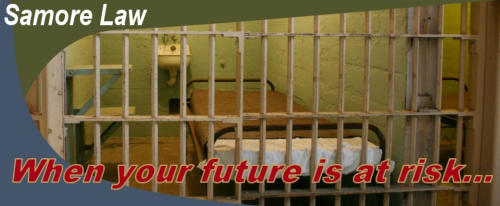

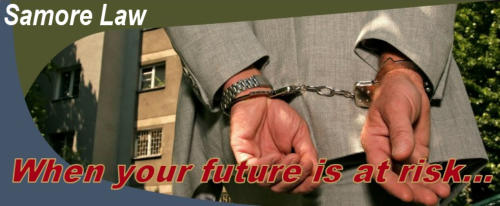
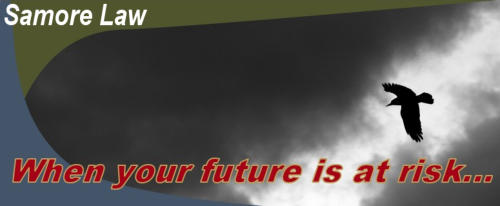



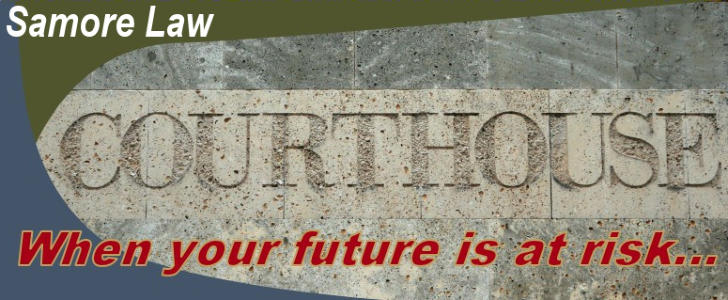
John Samore
Blog: Lawyer’s Insight on Legal
Matters:
- Legal Process -
Lawyer's Insight' is a periodic blog by Mr. Samore
on current legal issues that informs readers how
current, legal events influence
Americans' lives. If you would
like to ask Mr. Samore to
address a particular concern
which you may have, simply
send an email to the address at
left with subject "Questions for
Lawyer's Insight."
Click on the links below to
quickly reach a particular topic, or just scroll down
to read what is of interest. Other sources of
information from Mr. Samore are on the Common
Questions and About Us pages of this website.
If you don’t see a link to a topic of interest, check
the other Lawyer’s Insight pages.
Legal Process
• What are the financial commitments to help avoid conviction consequences? • We just received a Subpoena to testify and don't want to go. What should we do? • I just received a Grad Jury Target Letter! What do I do? • What basic information is needed for criminal prosecution cases? • How does plea bargaining work? • Why can't a simple majority of the Jury reach the verdict?What are the financial commitments to help avoid
conviction consequences?
July 14, 2016 Consequences of any conviction can be severe and follow you (and your family) all your life, so we like our clients to be realistic about the challenges that lie ahead. We encourage our clients to quietly consider the financial commitment that is required to retain any experienced private attorney to represent your most precious interests. Because most employed people are ineligible for a Public Defender, you must decide if you can afford a quality defense. Most lawyers do not give clients this opportunity before an office conference, and too many attorneys pressure folks to sign major obligations. Our office does not work that way. We do not try and scare anyone, nor do we minimize the importance and dangers of felony prosecutions. You will hire us because it is the best decision for you. There will always be someone who will undercut the price of a quality attorney, and either demand additional payments down the line or commit less time and effort because your money ran out. You would not fall for that misleading approach from a car salesman, and you are wise not to risk your future to someone who does not confront with the truth, however daunting it may be. You want a lawyer who will also explain how the resources you commit for a qualified forensic examiner or other expert witness, and an experienced, diligent private investigator can be every bit as important as your attorney. These expenses should be included in any initial consultation and determination of what "fees and costs" to defend your case are. When you leave a voice mail or message, find out how quickly your lawyer responds to your reasonable questions and concerns. If the State goes through the Preliminary Hearing procedure, the likelihood is high that you will be bound over for further prosecution. The reason is two-fold: Defense witnesses almost never testify at a Preliminary Hearing, because the Defense does not really know until that Hearing what the evidence is. The second reason is that their standard to bind an accused over is so low, "probable cause" that a crime has been committed, which does not even require fifty percent likelihood in proof. You will not be found "guilty" or "not Guilty" at a Preliminary Hearing or Grand Jury Presentment, so it is basic good sense and legal sense to hold back on showing the prosecutors what problems they have with their case against you. At this early stage of the proceedings, we learn the extent of evidence the State has and how determined they are to make you and example, even if a conviction or even the publicity!) causes permanent damage to you and your family. To defend against allegations, two other expenses you are likely to incur, could also be very helpful to achieving justice on your behalf. We give you all this information so you will be able to make the best decision for yourself. See these pages: Federal & State Felonies • Sex Offenses • Violent Crimes • White Collar CrimesI just received a Subpoena to testify and don't want
to go. What should we do?
March 8, 2015 When you receive a subpoena, the first thing you should do is see who issued the subpoena to you. It could be from a Grand Jury (read on for more info about grand juries), the district court, or one of the parties to a legal action. You should also verify whether the subpoena came from a federal or state court. All of that information should be on the face of the subpoena, as well as the telephone number of the person to contact if you have questions. A subpoena is a piece of paper you should respect because, if it is lawfully served and you do not honor it by showing up at the date and time identified on the subpoena, you can get into trouble. Under most circumstances, a subpoena must be handed to you by a sheriff's deputy or another impartial person who is paid by a third-party for serving process. You are also entitled to be reimbursed for your time and travel expense in appearing at the place you are asked to appear. This sum should be paid to you ahead of time and most reputable folks make arrangements for payment of the subpoena even before it is served. If you still have questions, call the number of the person listed at the bottom of that first page and ask. If you do not receive an answer you feel is satisfactory, you have every right to contact an attorney and describe the situation. The attorney may charge you some modest amount for the advice, and that is a good investment, because you do not want to get into more trouble than you really need by just ignoring a subpoena. Let your attorney make the proper contact with the responsible persons and provide you sensible information on how to proceed. It saves time and money in the long run. See these pages: Federal & State Felonies • Sex Offenses • Violent Crimes • White Collar CrimesI just received a Grand Jury Target Letter! What do I
do?
February 20, 2015 A Target Letter means that the District Attorney thinks that it has substantial evidence you committed a felony crime. The date of your appearance listed in that letter invites you to go before the Grand Jury and offer your explanation to some crime which the authorities have been investigating. The only people who testify before a grand jury are usually the detectives who have been investigation allegations against some citizens. On rare occasions, a person who is not involved in law enforcement will also testify. The District Attorney decides whom to call as witnesses before a grand jury. You should probably not respond or testify. A Target Letter is not a subpoena, so you do not have to show up at all. You have the right to testify if you want, but the cards are definitely stacked against you. A grand jury process is very secretive and is designed to help the District Attorney obtain an indictment charging someone with a felony crime. If the person suspected of committing a crime is foolish to testify to the grand jury, he or she does not even get to have a lawyer inside the grand jury room. The room is closed and all statements are recorded. If you say something that may be untrue, you could be committing a separate crime. If you are charged, anything you say could be used against you. This is one of the reasons that the District Attorney does not like to risk even calling an alleged victim or lay person as a witness, because his or her statements could later be used at trial for cross- examination. It is easier to get an indictment and keep the suspects (and their lawyers) in the dark about the evidence if only the investigator is called before the grand jury. That investigator will only give the grand jury the juicy evidence that would indicate you committed some crime. The DA would love to have you out there, all alone, in front of up to 23 grand jurors who only need to find "probable cause" that a crime has been committed. Probable cause is a very low standard; it doesn't even have to be fifty percent likely that any crime was even committed. But remember: the grand jury does not find you guilty or not guilty, it just moves the case closer to trial by agreeing to have you indicted. Just being indicted means the charge appears on the public record and that you have to appear in court before a judge. That alone can mess with a person's life! It also affects the lives of the people around the accused citizen. If you receive a target letter, get yourself a lawyer right away to start helping you. Even without you actually testifying before the grand jury, New Mexico is one of the very few states that permits a suspect to present evidence to the grand jury in the form of affidavits, questions to ask the witnesses, and documentary or photographic evidence. This is very tricky going, so do not try to do this alone! A lawyer can help you bring together evidence that might explain that no crime occurred or that you are not a culprit. See these pages: Federal & State Felonies • Sex Offenses • Violent Crimes • White Collar CrimesWhat basic information is needed for criminal
prosecution cases?
August 1, 2014 You or someone you love can be prosecuted in either federal or state court. The Rules are similar but, as far as the consequences and all the factors that influence how a prosecution is resolved, federal and state courts are very, very different. .Federal and state courts have different courthouses, different set of judges, different set of prosecutors, and different punishment for those who are convicted. They even have a different way that cases are brought from mere allegation to trial. They even have a different prison system, but prison looks a lot the same when you are behind bars. It is our job to keep you from that humiliating experience. Many acts are crimes that violate both federal and state laws. We use the word "alleged" a lot because that means the Government (by its chosen prosecutors) claim that someone did a certain act that violates one or more laws, and "alleged" means it just hasn't been proven. The same alleged criminal act can be prosecuted in either federal or state courts and even in both. It is not like the prosecutors must choose one forum (federal or state) or the other, but they usually do. Prosecutors of federal crimes are called "Assistant United States Attorneys" and work under the "United States Attorney" who is appointed by the President for all fifty states (some of the states with the largest populations have more than one United States Attorney, who are each appointed for certain areas). State crimes are prosecuted by the District Attorney who is elected every four years in each of our state's thirteen judicial districts, and Assistant District Attorneys do the actual prosecuting. Even (state) Assistant District Attorneys (ADA) will admit that the more prestigious job is to be an Assistant United States Attorney (AUSA). Many an ADA works years to become qualified for an position as an AUSA. The job pays much more, has better benefits, and is better funded. All of which is not to say that ADAs are not honorable and capable attorneys. It is just a fact of life that goes into the mix of your entire case. A state court felony prosecution may begin with a complaint that leads to a preliminary hearing or a grand jury indictment. The state's most populous county is around Albuquerque, and the preliminary hearing process has not been used for many a year. To be indicted by a grand jury, the person suspected of a crime is sent by the DA what is called a "target letter" to inform the suspect that a hearing on the allegation will be conducted in secret a few days hence. This is the point at which most defense attorneys wish you would contact us to represent you, because we have a chance to get some evidence on your behalf to the grand jury. We do not want you ever to testify yourself before the state Grand Jury. When the Grand Jury meets, it usually hears only a short summary of evidence from the investigators and must, then, vote by a simple majority of the grand jurors present (up to 23) that it is more likely than not that a crime occurred. That standard for proof is a lot less than what is necessary to convict you before a jury, but the mere filing of a charge starts the long and agonizing process leading to possible trial that can adversely effect your life forever. The best result would be if you were never charged at all. The investigators of federal prosecutions simply sign an affidavit to a complaint that is enough to have you taken into custody. If you learn of an investigation into your alleged conduct, try to get a defense attorney to work for you right away, if you can afford one. Sometimes, we can work with you and the prosecutors to resolve misunderstandings before things get even more expensive. If you cannot afford an attorney at this "pre-indictment" stage, you will soon be taken before a magistrate Judge for a Preliminary Hearing and may be held in custody until a federal Grand Jury meets to hear just the Government's side of the case against you. Then the really hard work begins. On the other end of the prosecution is a different problem for accused people, perhaps, the main difference between state and federal systems. The United States Sentencing Guidelines were passed in 1985, supposedly to take away judges' discretion to vary sentences on the same crime of conviction for different people. The real reason is that the same Congress who passed these severe, required penalties had passed, only the year before, legislation to permit prisons to be owned by private corporations for the first time. These corporations needed to be assured of bodies to fill their cells and be able to bill the taxpayers, and this repulsive coincidence has, thirty years later, left our "Land of the Free" with the highest percentage of its population in prison -- by far -- than any other country in the world. For thirty years, our office represents people accused of crimes in both federal and state courts. We handle primarily major felonies and only rarely do DWI or misdemeanors. We usually do those kind of cases when former clients have a special problem that they want us to handle. Because we are set up to litigate thoroughly, we handle those cases well, but, if you are looking for a bargain low price attorney to handle a DWI, please call one of the many attorneys who are set up to handle a volume of low-cost cases. Our office is set up for individualized, one-on-one, intense commitment to the more major prosecutions with severe and permanent consequences. Another nice thing about New Mexico is that we have an active defense bar, which means you have many capable lawyers who might help you or your loved ones. The key is that you meet, assess, and find that one committed lawyer with whom you feel you can work to the best result. It is more than just a smile, a handshake, a fancy office, the fee charged, and even the reputation. It is all those things and a lot more, and you must consider everything when you make this major decision. See these pages: Federal & State Felonies • Sex Offenses • Violent Crimes • White Collar CrimesHow does plea bargaining work?
June 30, 2014 I can sure try, but, no matter what I say, I'll have to leave a lot out. Plea Bargains are the way most criminal cases resolve, and without plea bargaining, the criminal justice system would grind to a halt. There simply are not enough attorneys and judges and courthouses and law officers to take each case to a trial. If you ever hear some politician telling you "There is too much plea bargaining" or "I'll put a stop to plea bargaining," you can bet your last dollar that he/she is all bluster and ignorance. (And you can quote me when you tell them that!) The lawyer's Code of Ethics and Local Rules REQUIRE us to always work toward resolution of a pending case by plea bargain, out of respect to judges' limited time for conducting trials and the enormous expenses of going to trial. If you are considering some attorney who acts like prosecutors are the enemy and postures on a website how combative they are, be careful! This is not even ethical. We defense trial lawyers are quite capable of fighting to the death for you if a case goes to trial, but it does not serve most people (whether defendant or alleged victims) to go through the agony of trial. Trials are exciting for the lawyers but agony for the participants. A good Defense attorney or prosecutor should cultivate professional relationship with the other side, because it ends up serving the clients better than constant antagonism. When you have honorable attorneys from both sides, reasonable cops, and sensible judges, plea bargains can be a very fair way to resolve pending cases. The Defense is already at a distinct disadvantage when the client is charged, because the law officers have usually been working on the case many weeks, talking to witnesses and building evidence. Our office examines very closely all the evidence against our clients. We have several very experienced private investigators who work for us and are assigned to each case. They leave no stone unturned in finding ways to support our clients; we couldn't get the results that we do without their excellent work. Although too many officers and even prosecutors meet with witnesses and pressure witnesses not to talk to anyone representing the Defense, our investigators do their very best to get the full story from the witnesses. They will also work to develop other witnesses and forensic evidence to support you. When the case involves forensic evidence such as DNA or ballistics, we shall find the best experts to prepare a report that explains what the forensic evidence really means. If our client has made admissions or incriminating statements to officers, we see if those statements occurred after they were entitled to warnings of their precious Constitutional rights. A developing body of research shows how very often people "falsely confess" to crimes they did not commit and how law officers are trained to specialize in twisting unsophisticated folks up in knot to obtain admissions, whether or not the admissions are true. Highly-qualified psychologists can determine whether a suspect actually understood his rights or was intentionally misled or just conceding to get out of an uncomfortable situation. We shall consider that option if it applies in your case. Once our investigation is complete, we can set a time to talk to the prosecutor about the evidence from both sides. Any competent defense attorney cannot boast that he or she wins every case or has special powers, because we have an obligation to respect the alleged victims and the prosecutors; they have reasonable concerns, too. If an attorney misrepresents facts or law to the other side, he/she may get away with such behavior once or twice, but soon that kind of deceit hurts the lawyer's reputation in the legal community and will hurt all future clients. Over the past thirty years, our office has developed a reputation with both State and Federal prosecutors that helps reach a fair resolution that respects both sides of the process. As your advocate, we consider the hundreds of variations on the your situation and your particular, most important concerns. Sometimes, a client comes to us and says that conviction of any charge will destroy their family or job, so we really just must to trial or discover a fatal flaw in the prosecution that will convince the prosecutor to dismiss the case without even going to trial. Other times, the client know the risk of trial and wants to see if we can narrow our differences with the prosecutors. Sometimes, a client tell us from the beginning, "I want to admit that I did something wrong, but these charges are worse than what I did." It is our job to do all the above work and more, but we do not make the final decision - you do. We give you all the information possible, then you decide. CAN YOU GIVE US EXAMPLES? Of course, here are three: 1. When Thomas' two-year-old son died while in his custody, overeager investigators suspected he was responsible for the head injuries that killed him. He was charged with first degree murder. We found a world-recognized pathologist from Minnesota who examined the medical records and concluded that the injuries had actually occurred four weeks earlier, when the child was living with his Mother. Our investigator found that the child had fallen about eight feet from the bleachers at a high school basketball game during that time frame and the subdural bleed probably began then. On the eve of trial, the Government's own experts finally admitted their error, agreed with our pathologist, and the charges were dismissed. 2. Nathan was a socially inept, naive young man of 21 who lived his whole life in a remote community of barely one hundred people. He never had anything close to a girlfriend, except in his dreams. When a young lady, whom he knew only by texting, told him that she lived only a mile way, that her Mother was gone for the morning, and that he should come over to "have fun" with her, he thought he would have his first sexual experience. Instead, her Mother came home early, caught them in the act, and only then did he learn that she was just 14. He was looking at almost twenty years in prison for criminal sexual abuse, but we developed some law that his mistaken belief was a full defense. The girl helped our case by being telling the prosecutor that she never told Nathan her age and was proud she looked so grown up. The prosecutor, known to be a man of honor, took a look at these facts, and we resolved the case by pleading Nathan to a simple misdemeanor assault. 3. We have had several clients who have faced charges that required specific legal knowledge and, by developing leaning disability issues, the charges are quietly resolved with no jail time and, oftentimes, no conviction. I never claim credit for these resolutions, because they take a respected examining psychologist and a fair-minded prosecutor, to protect the client's interests. These are among the many examples of how both prosecutor and defense attorneys can work with the families of the alleged victims and the accused persons to reach a fair resolution that serves the parties and society. See these pages: Federal & State Felonies • Sex Offenses • Violent Crimes • White Collar CrimesWhy can't a simple majority of the Jury reach the
verdict?
July 25, 2013 SOME OF US WONDER WHY JURY VERDICTS IN CRIMINAL TRIALS HAVE TO BE UNANIMOUS. WHY CAN'T A SIMPLE MAJORITY OF THE JURY REACH THE VERDICT? Not all countries do it this way, but most countries that let citizen-jurors make the decision require unanimous verdicts. There are good reasons why it is this way. First of all, remember that a jury verdict in a criminal trial must be unanimous either way: every juror has to vote "guilty," or every juror has to vote "not guilty." Until all the jurors agree, one way or another, there is no verdict to take back to court. As an example of other ways to do it, back in the time of Jesus, the the Hebrew elders formed a judicial body known as the Sanhedrin to make decisions on legal conflicts. If, at the end of a trial, all of the Sanhedrin members (over 100!) voted "guilty," Hebrew law require that the verdict be vacated, and the trial begun anew. This unique approach is because the law presumed, if everyone voted guilty on the first ballot, the trial could not have been fair. (Think how long our cases would go on with such a standard!) In other Western democracies, a panel of judges make the decisions in criminal trials, and they do not have to agree on the verdict. If they vote 2-1 in Britain, the verdict is set. We have a long history of trial by a "jury of peers" in this country, established in a time when early Americans were very suspicious that a panel of judges (almost always from the richer class) would be too biased against any accused citizen. Before a jury (of twelve or six, depending on the charge) and alternates is even chosen to serve, the assigned judge and attorneys for the participants are supposed to ask questions of a larger group of potential jurors to try and pick a fair and balanced jury. The process of jury selection is called voir dire, a French phrase that means "to tell the truth." If you go to trial with our office, we shall work closely with you quite to review juror questionnaires (provided a few days before the process of jury selection begins) and receive your opinions on which jurors you think will be more fair to you. See more about violent crimes.







